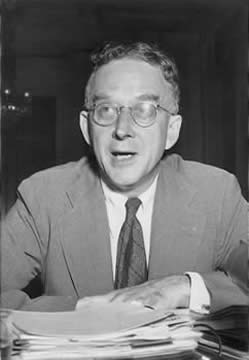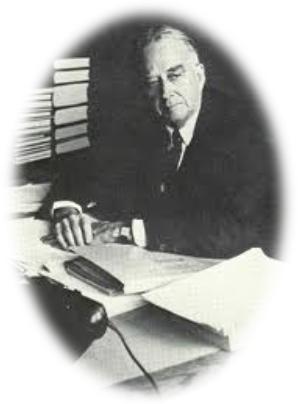<Back to Index>
- Diplomat and Jurist Philip Caryl Jessup, 1897
PAGE SPONSOR


Philip Caryl Jessup (January 5, 1897 - January 31, 1986) was a diplomat, scholar, and jurist from New York City.
Philip C. Jessup, the grandson of Henry Harris Jessup, received his undergraduate degree from Hamilton College in 1919. He then went on to earn a law degree from Yale Law School in 1924 and a Ph.D. from Columbia University in 1927.
Jessup married Lois Walcott Kellogg in 1921.
While pursuing his Ph.D., and for a good time thereafter (1925 - 1946), Jessup served as a lecturer and professor in international law at Columbia Law School. In 1946, he was named the Hamilton Fish Professor of International Law and Diplomacy at Columbia Law, a post he held until 1961.
Jessup served as assistant secretary - general of the United Nations Relief and Rehabilitation Administration (UNRRA) conference in 1943 and the United Nations Monetary and Financial Conference (the "Bretton Woods" conference) in 1944. He was a technical advisor to the American delegation to the San Francisco United Nations charter conference in 1945.
Jessup became a primary target of Senator Joseph McCarthy, who charged in the 1950 Tydings Committee hearings that Jessup was a security risk who had "an unusual affinity... for Communist causes." McCarthy wasn't allowed by the Tydings Committee to outline his case regarding Jessup but the committee did allow Jessup to fly in from Pakistan and give his defense against charges that McCarthy had not yet even made. Jessup was subsequently cleared of all charges by the Loyalty Board of the State Department and the Tydings Committee, and McCarthy was rebuked by many fellow senators and other statesmen. However, in two speeches on the floor of the Senate, McCarthy gave his evidence regarding Jessup's "unusual affinity for Communist causes":
1.That Jessup had been affiliated with five Communist front groups; 2.That Jessup had been a leading light in the Institute of Pacific Relations (IPR) at a time that organization was reflecting the Communist Party line; 3.And that he had "pioneered the smear campaign against Nationalist China and Chiang Kai-shek" and propagated the "myth of the 'democratic Chinese Communist'" through the IPR magazine, Far Eastern Survey, over which he had "absolute control"; 4.That Jessup had associated with known Communists in the IPR; 5.That the IPR's American Council under Jessup's guidance had received more than $7,000 of Communist funds from Frederick Vanderbilt Field; 6.That Jessup had "expressed vigorous opposition" to attempts to investigate Communist penetration of the IPR; 7.That Jessup had urged that United States atom bomb production be brought to a halt in 1946, and that essential atomic ingredients be "dumped into the ocean"; 8.That Jessup had appeared as a character witness for Alger Hiss, and that later, after Alger Hiss's conviction, Jessup had found "no reason whatever to change his opinion about Hiss's veracity, loyalty and integrity."
McCarthy's allegations severely damaged Jessup's reputation and career and of the 110 names provided to the Tydings Commission, 81 of those on McCarthy's list left the government, either by dismissal or resignation.
Nonetheless, President Harry S. Truman appointed Jessup as United States delegate to the United Nations in 1951. However, when the appointment came before the Senate it was not approved, largely because of McCarthy's influence. Truman circumvented the Senate by assigning Jessup to the United Nations on an "interim appointment."
Shortly after John F. Kennedy took office as president, the State Department approved the appointment of Jessup as U.S. candidate for the International Court of Justice, a post that did not need Senate confirmation. He served from 1961 until 1970.
Upon returning from The Netherlands, Jessup took up a series of academic positions at The University of Georgia School of Law, Columbia University, and Wellesley College.
An international law moot court competition, the Philip C. Jessup Cup, is named in Jessup's honor. It is held annually in Washington D.C.and is attended by law students from around the world.